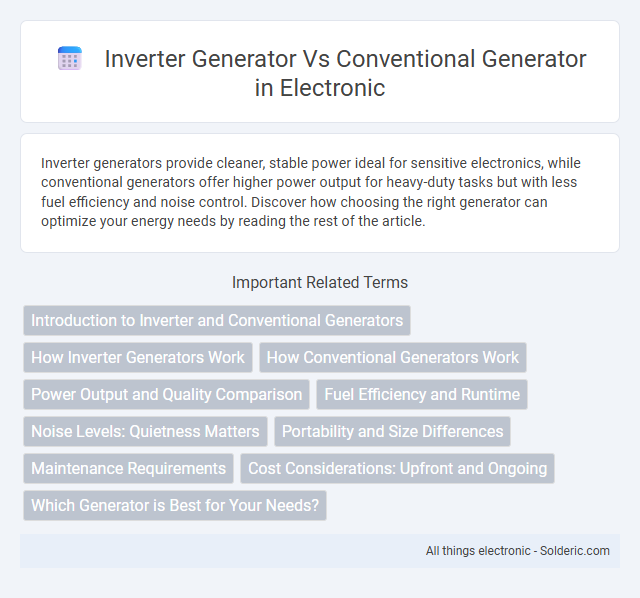Inverter generators provide cleaner, stable power ideal for sensitive electronics, while conventional generators offer higher power output for heavy-duty tasks but with less fuel efficiency and noise control. Discover how choosing the right generator can optimize your energy needs by reading the rest of the article.
Comparison Table
| Feature | Inverter Generator | Conventional Generator |
|---|---|---|
| Power Output | Clean, stable, suitable for sensitive electronics | Raw, less stable, may harm sensitive devices |
| Fuel Efficiency | High, adjusts RPM based on load | Lower, runs at constant RPM |
| Noise Level | Quieter, lower decibels (50-60 dB) | Louder, higher decibels (70+ dB) |
| Portability | Lightweight, compact, easier to carry | Heavier, bulkier, harder to move |
| Price | Higher initial cost | Lower initial cost |
| Applications | Camping, RVs, electronics, outdoor events | Home backup, construction, heavy equipment |
| Maintenance | Less frequent due to advanced tech | More frequent, simpler mechanics |
Introduction to Inverter and Conventional Generators
Inverter generators utilize advanced electronic circuitry to convert raw power into clean, stable electricity ideal for sensitive devices, whereas conventional generators produce raw AC power directly. Inverter generators are typically more fuel-efficient, quieter, and lighter, making them suitable for recreational use and powering electronics. Conventional generators, often larger and louder, deliver a steady power output better suited for heavy-duty applications and extended operation.
How Inverter Generators Work
Inverter generators use advanced electronics to convert raw AC power into DC power and then invert it back to clean, stable AC power, ensuring consistent voltage and frequency. This process allows them to produce high-quality electricity that safely powers sensitive devices like laptops and smartphones, unlike conventional generators that often deliver fluctuating power. Their efficient operation reduces fuel consumption and noise levels, making them ideal for portable and residential use.
How Conventional Generators Work
Conventional generators operate by converting mechanical energy from an internal combustion engine into electrical energy through electromagnetic induction. They produce a consistent and stable output voltage but often result in fluctuating power quality due to speed variations in the engine. These generators typically use larger engines with less efficient fuel consumption, leading to louder noise levels and increased emissions compared to inverter generators.
Power Output and Quality Comparison
Inverter generators produce clean, stable power with consistent voltage and frequency, making them ideal for sensitive electronics, while conventional generators often deliver fluctuating power that can damage such devices. Typically, inverter generators offer lower wattage output, ranging from 1,000 to 4,000 watts, compared to conventional generators that can exceed 10,000 watts, providing greater raw power for heavy-duty applications. The superior power quality of inverter generators results from advanced microprocessor control, enabling efficient fuel consumption and quieter operation alongside reliable, high-quality electrical output.
Fuel Efficiency and Runtime
Inverter generators provide superior fuel efficiency by adjusting engine speed to match power demand, resulting in longer runtime compared to conventional generators running at a constant speed. Conventional generators consume more fuel as they operate at full throttle regardless of load, reducing overall operational time before refueling. Your choice of an inverter generator ensures optimal fuel usage and extended runtime, especially during fluctuating power needs.
Noise Levels: Quietness Matters
Inverter generators produce significantly lower noise levels, often operating between 40 to 60 decibels, making them ideal for noise-sensitive environments. Conventional generators commonly emit noise levels exceeding 70 decibels, which can be disruptive during use. Choosing an inverter generator ensures your power source remains quieter, enhancing comfort during outdoor activities or residential use.
Portability and Size Differences
Inverter generators are significantly more compact and lightweight compared to conventional generators, making them easier to transport and ideal for outdoor activities or emergency use. Their advanced design allows for quieter operation and enhanced fuel efficiency, which reduces the overall burden when carrying or storing your power source. Conventional generators tend to be bulkier and heavier due to their rugged build and less efficient technology, limiting portability and requiring more effort to move.
Maintenance Requirements
Inverter generators require less frequent maintenance due to advanced electronic components and more efficient fuel consumption, reducing wear on engine parts. Conventional generators demand regular oil changes, air filter replacements, and spark plug checks to maintain performance and prevent breakdowns. The reduced maintenance schedule of inverter generators often results in lower long-term upkeep costs and greater reliability for users.
Cost Considerations: Upfront and Ongoing
Inverter generators typically have a higher upfront cost compared to conventional generators due to advanced technology and better fuel efficiency. Ongoing expenses for inverter generators are lower because of reduced fuel consumption and quieter operation requiring less maintenance. Conventional generators may have lower initial prices but often incur higher fuel and maintenance costs over time.
Which Generator is Best for Your Needs?
Inverter generators deliver cleaner power ideal for sensitive electronics, operate quietly, and offer better fuel efficiency, making them best for camping, tailgating, or small household use. Conventional generators provide higher power output at a lower initial cost, suitable for heavy-duty applications like construction sites or emergency home backup. Assess your power requirements, noise tolerance, and budget to determine the most suitable generator for your specific needs.
inverter generator vs conventional generator Infographic

 solderic.com
solderic.com